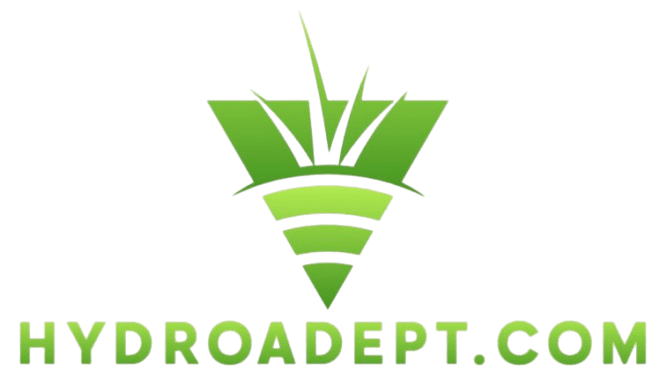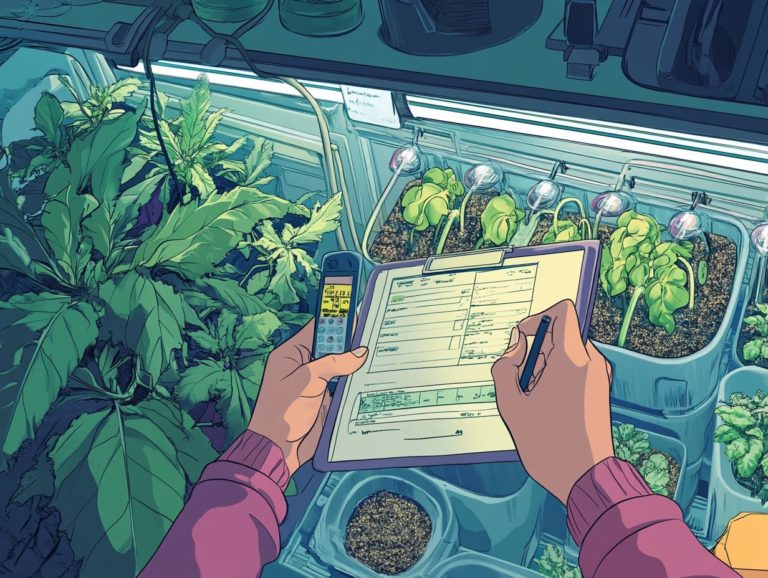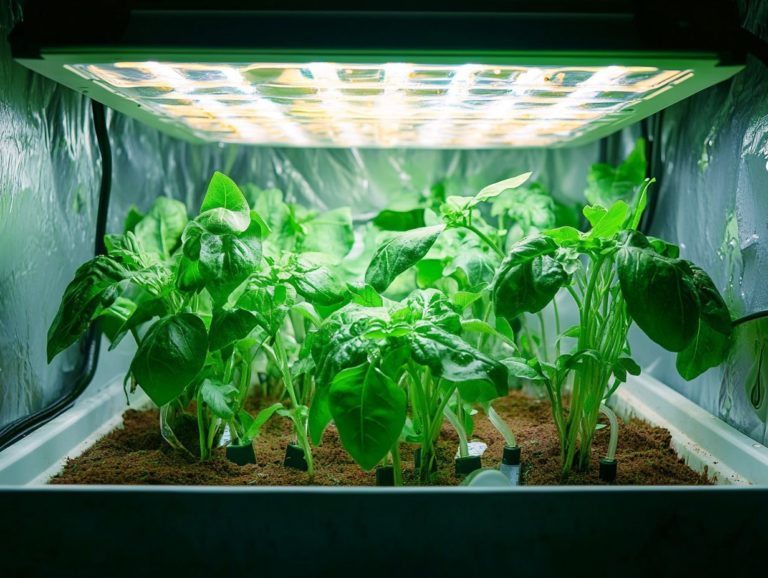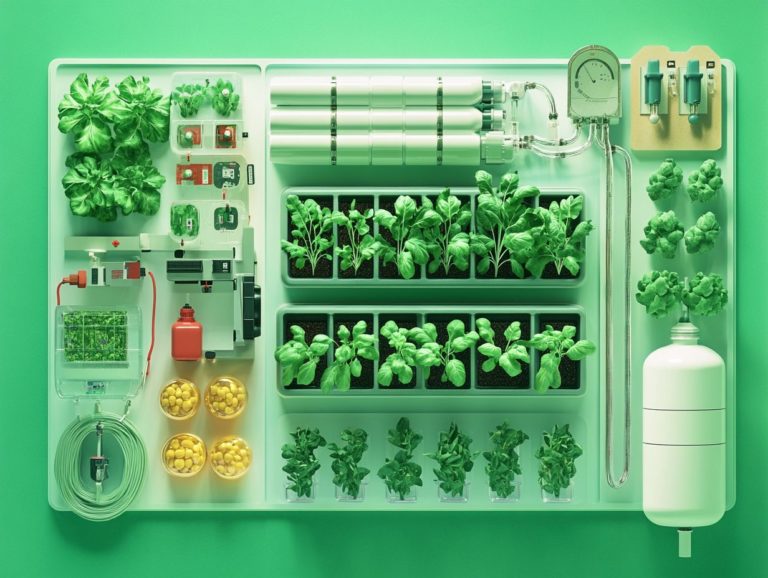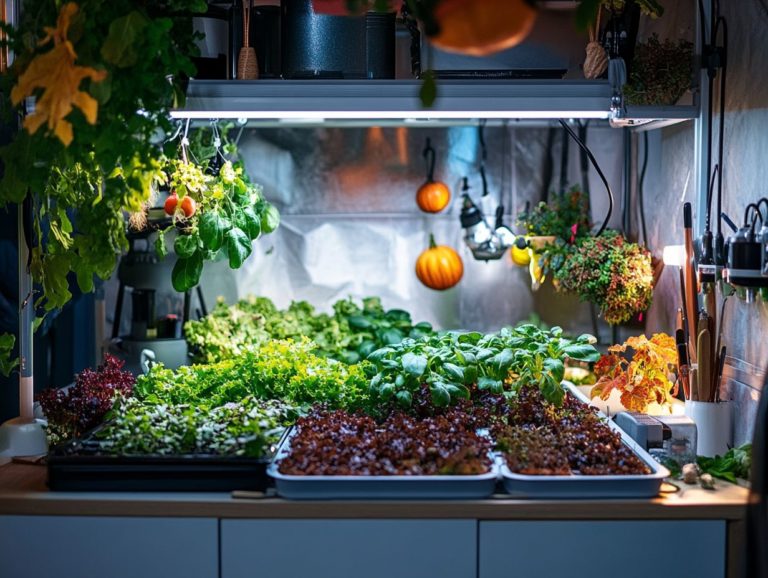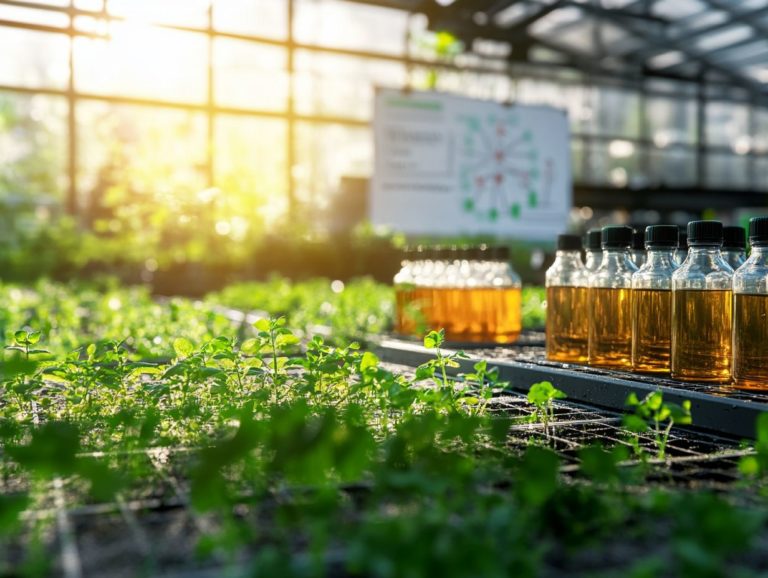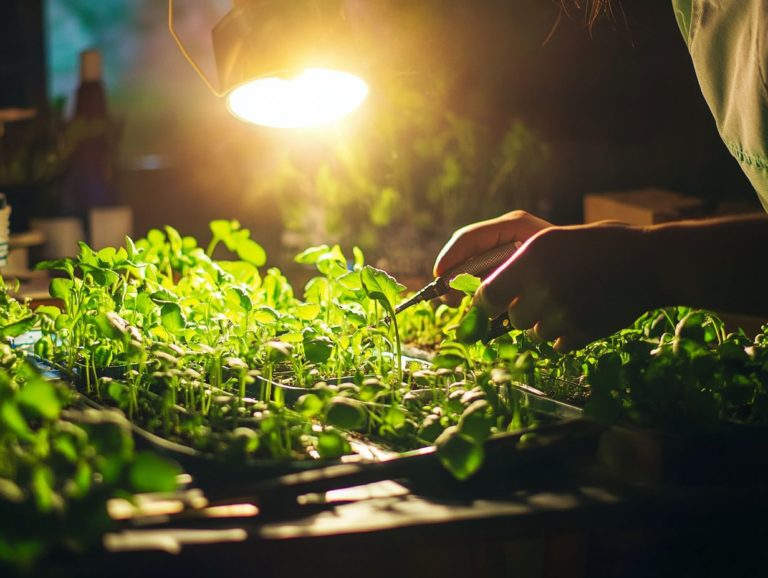How to Ensure Hydroponic System Longevity
Hydroponics is revolutionizing how we grow food! This groundbreaking method allows you to cultivate plants without soil, giving you precise control over water and nutrients.
In this article, discover the myriad benefits of hydroponic systems. You’ll explore their distinct advantages over traditional gardening methods.
Delve into key factors that influence the longevity of your system. Receive troubleshooting tips for common issues and learn effective maintenance practices that extend its lifespan.
Whether you re a seasoned gardener or new to the scene, this guide arms you with essential knowledge to flourish in the realm of hydroponics.
Contents
- Key Takeaways:
- Benefits of Hydroponic Systems
- Factors Affecting Longevity
- Common Problems and Solutions
- Preventing Damage and Extending Lifespan
- Frequently Asked Questions
- Ever wondered what a hydroponic system is and why keeping it running longer is a game changer?
- How can I maintain the cleanliness of my hydroponic system for long-term use?
- What are some common issues that can affect the longevity of a hydroponic system?
- Can using organic nutrients help prolong the longevity of a hydroponic system?
- How often should I replace the nutrient solution in my hydroponic system?
- Are there any preventative measures I can take to ensure the longevity of my hydroponic system?
Key Takeaways:
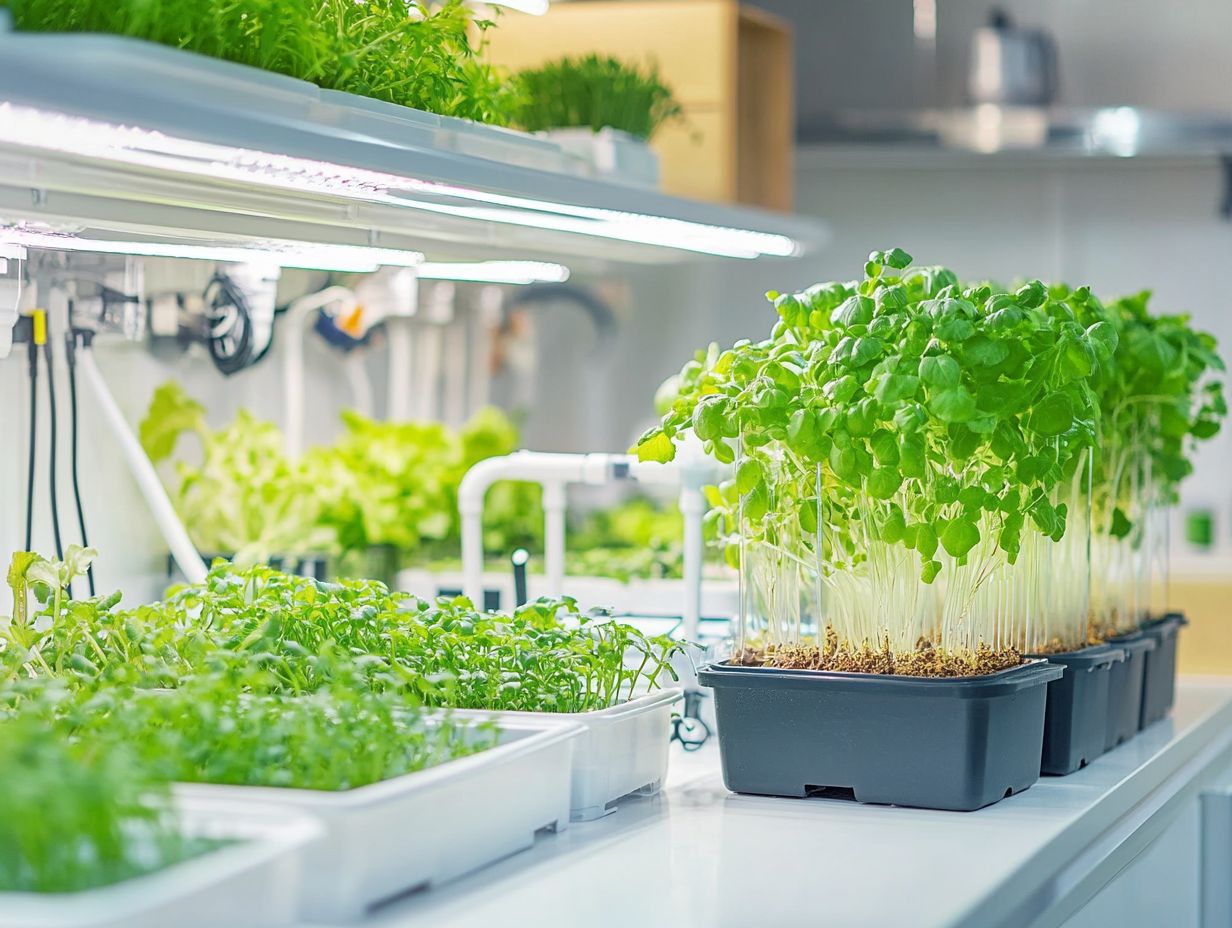
- Regular maintenance and care, including weekly maintenance and seasonal tasks, are key to ensuring the longevity of your hydroponic system.
- Understanding factors like proper nutrition, the acidity or alkalinity of the water, and oxygen availability is crucial for success.
- By addressing common problems and implementing effective maintenance practices, you can prevent damage and extend the lifespan of your hydroponic system.
What is Hydroponics?
Hydroponics is a cutting-edge growing method that allows you to cultivate plants in water mixed with nutrients instead of soil. This elevates plant health and maximizes crop yields.
This technique uses a balanced mix of nutrients and careful water quality management to encourage vigorous plant growth, making it a sustainable choice for modern agriculture.
By closely monitoring environmental factors, like temperature and humidity, you ensure essential nutrients and oxygen are readily available. This leads to heightened efficiency and productivity.
Rooted in ancient civilizations, hydroponics has transformed into various systems, including nutrient film technique (NFT), aeroponics, and deep water culture.
Each system offers distinct advantages, such as reduced water consumption and fewer pest issues. This makes them more sustainable than traditional farming.
With the ability to customize nutrient solutions, you can tailor your plants diets, optimizing growth cycles and enhancing overall yields. As agriculture faces challenges like climate change, hydroponics emerges as a practical solution.
Benefits of Hydroponic Systems
Hydroponic systems present a wealth of advantages, including increased crop yields and efficient water management. This makes them appealing for both commercial and home gardeners.
With these systems, you achieve precise control over nutrient balance and water quality, creating perfect conditions for various plant species to thrive.
By employing advanced cultivation techniques, you can also reduce the influence of environmental factors. This results in healthier plants and more sustainable agricultural practices.
Ready to start your hydroponic journey? Dive into the world of hydroponics and discover how it can transform your gardening experience today!
Advantages over Traditional Gardening
Hydroponics offers remarkable advantages over traditional gardening methods, particularly in resource efficiency, crop safety, and plant health. Unlike conventional soil-based approaches, hydroponics uses significantly less water and eliminates risks tied to soil-borne bacterial pathogens. This improvement enhances food safety.
By employing a nutrient solution, a mix that provides plants with essential food, you gain precise control over nutrient levels. This results in healthier plants and increased productivity. Additionally, preventing algae growth in hydroponic systems is crucial for maintaining optimal conditions. Embracing this innovative growing technique allows you to achieve impressive crop yields while reducing water consumption by up to 90% compared to traditional methods.
Hydroponic systems naturally reduce pest issues, creating a more controlled environment that further supports plant health. Never underestimate the importance of water quality; using clean, mineral-rich municipal water is crucial to maximizing these benefits. Additionally, understanding hydroponic system maintenance and paying attention to detail helps your plants flourish and provide superior nutritional value.
This method not only promotes sustainability but also addresses the growing demand for high-quality produce in today s health-conscious market.
Factors Affecting Longevity
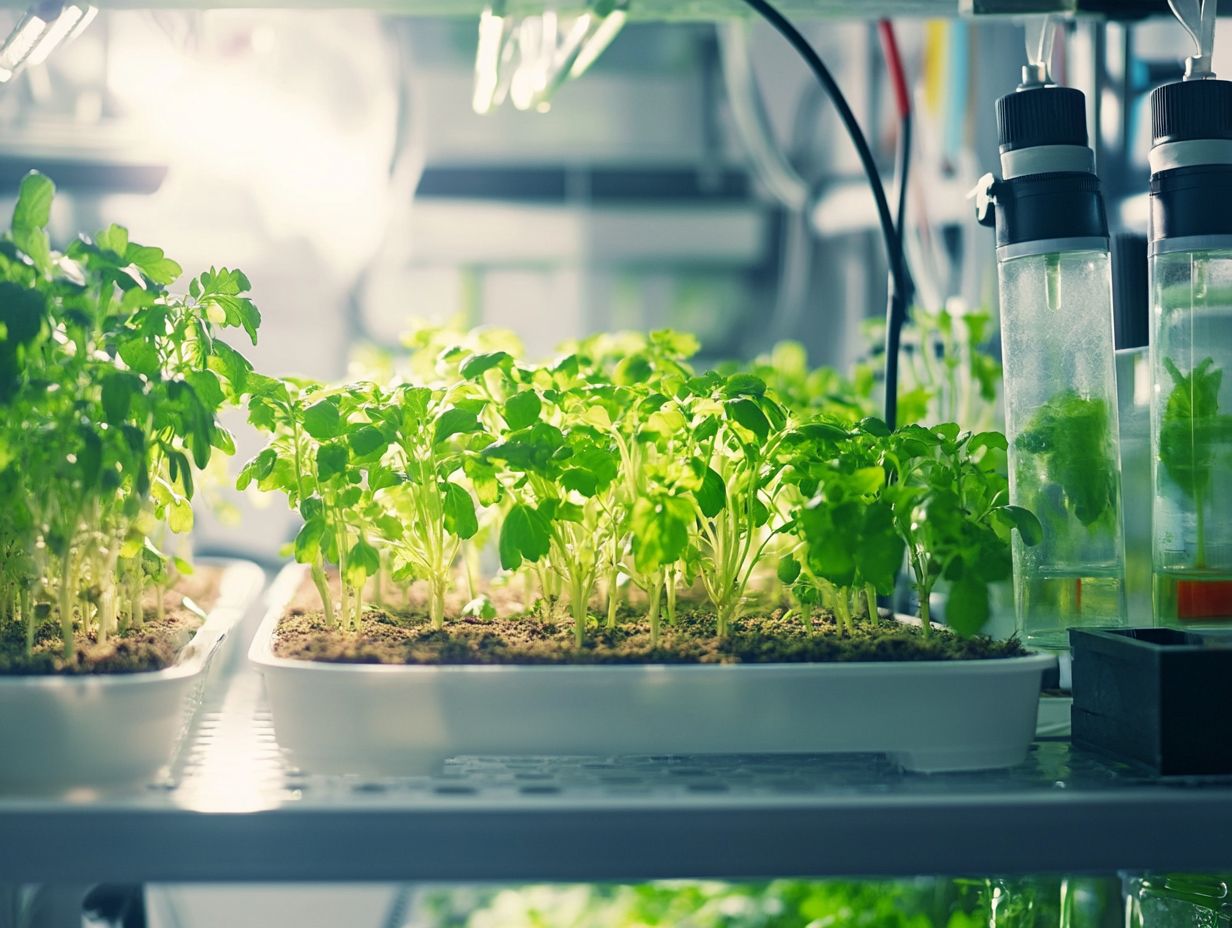
Several factors play a crucial role in the longevity of hydroponic systems. These include nutrient levels, environmental conditions, and diligent system monitoring. All are essential for maintaining optimal growth conditions.
Regularly assessing water circulation, pH balance, and nutrient delivery significantly enhances the health and lifespan of your hydroponic setup. By prioritizing these elements, which include proper handwashing stations and cleaning solutions, you can ensure that your systems operate efficiently over time.
This reduces the need for frequent maintenance and adjustments.
Key Considerations for System Maintenance
Effective hydroponic maintenance is essential for ensuring optimal plant growth and the longevity of your system. Key tasks involve regularly changing the nutrient solution, testing the water, and using the right cleaning solutions. Doing this enhances nutrient uptake and water quality while minimizing risks associated with bacterial pathogens.
Adopting a systematic approach to maintenance enables you to maintain high levels of plant health and productivity. Regular cleaning, ideally on a bi-weekly schedule, is crucial for removing algae and debris that can harbor harmful microorganisms. Additionally, knowing how to prevent nutrient deficiencies in hydroponics can further enhance your gardening success.
Nutrient management should be part of your weekly routine to ensure your plants receive the correct balance of essential elements. Adjust nutrient concentrations as necessary based on their growth stage. Testing the water at least once a week allows you to monitor pH levels and electrical conductivity, keeping your system within the optimal range. For further insights, learn how to evaluate hydroponic system performance.
By committing to these maintenance tasks, you foster a thriving environment for plant growth and extend the overall life of your hydroponic systems. Additionally, knowing how to troubleshoot common hydroponic issues is vital for any serious grower looking to achieve success!
Common Problems and Solutions
Navigating the complexities of a hydroponic system can present challenges like nutrient deficiencies and water quality concerns. Effective troubleshooting strategies are necessary to overcome them.
Engaging in regular crop monitoring and implementing timely interventions allows you to pinpoint and tackle these issues before they affect plant health and yields.
By employing appropriate cleaning solutions and maintenance practices, you can preemptively address many of these challenges, creating a flourishing hydroponic environment. For more detailed guidance, check out how to troubleshoot hydroponic system failures. Act now to keep your hydroponic system running efficiently!
Troubleshooting Tips for Common Issues
When tackling common issues in hydroponic systems, remember that troubleshooting tips can be your best allies in maintaining nutrient balance and ensuring crop safety. Spotting nutrient deficiencies early is crucial for safeguarding plant health. Adhering to sanitation protocols can prevent contamination while enhancing overall system performance. These proactive measures are essential for sustaining a successful hydroponic operation.
One highly effective approach is to consistently monitor pH levels and electrical conductivity. Any fluctuations can signal underlying nutrient imbalances. For example, a sudden drop in pH may indicate nutrient lockout, preventing your plants from absorbing essential minerals, even though they are present in the system. To enhance your gardening success, consider checking out this guide on how to optimize your DIY hydroponic setup.
Establishing a routine cleaning schedule for your reservoir is another key strategy. This helps mitigate water quality issues and reduces the risk of harmful pathogen growth. Maintaining proper airflow and optimal lighting supports ideal growth conditions.
Understanding and addressing these critical factors empowers you to cultivate a thriving environment that fosters healthy plant development in your hydroponic setup.
Preventing Damage and Extending Lifespan
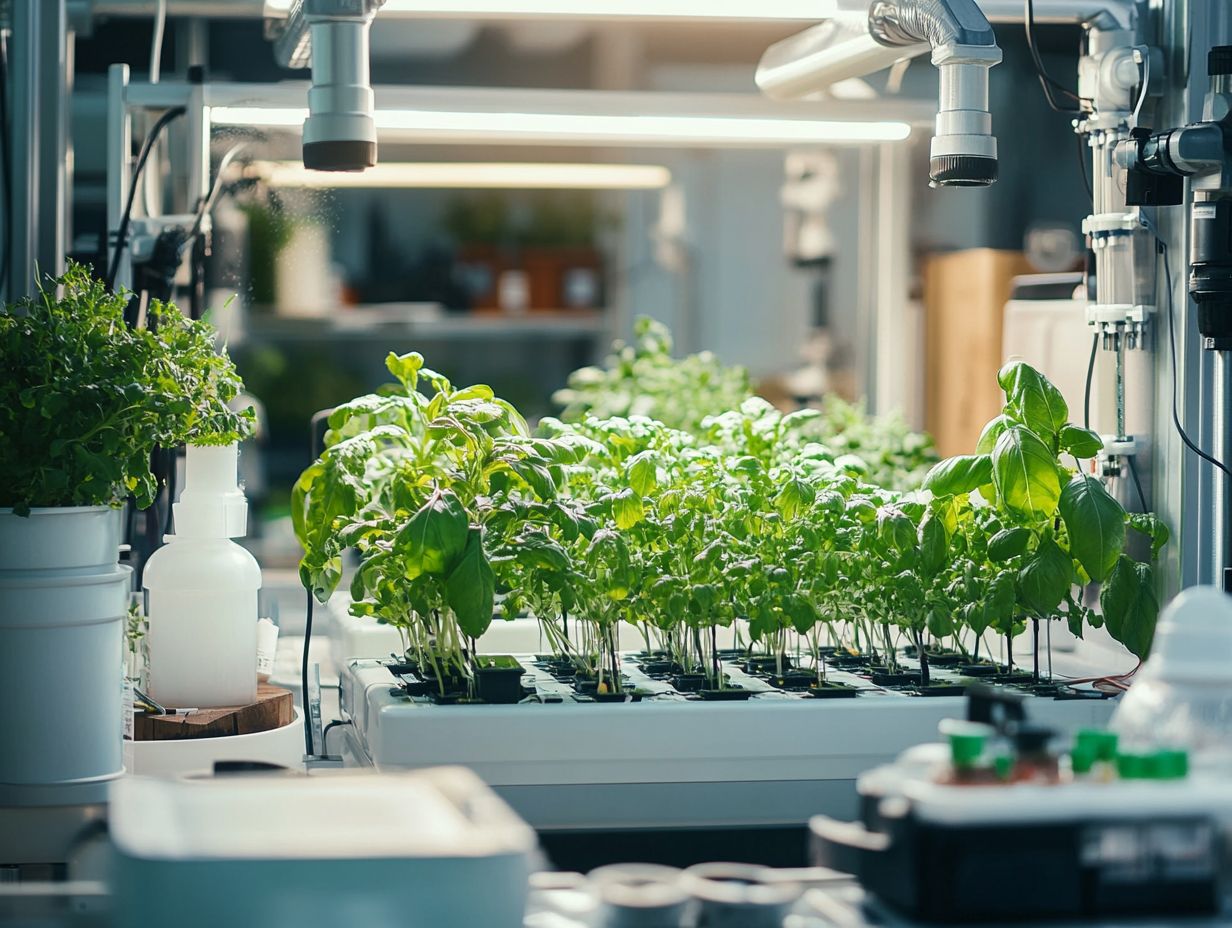
To safeguard your hydroponic systems and prolong their lifespan, it’s crucial to engage in regular maintenance practices. This includes managing irrigation lines and adhering to both weekly and seasonal tasks.
Taking these proactive measures boosts system efficiency and greatly enhances the overall health of your plants. For optimal results, learn how to maintain hydroponic equipment. Consistent monitoring of your crops allows you to identify issues early on, ensuring that your hydroponic environment remains stable and productive.
Effective Maintenance and Care Practices
Implementing effective maintenance and care practices in hydroponics is crucial for ensuring optimal growth and productivity. This is especially important when it comes to managing irrigation lines and nutrient delivery systems. By regularly using cleaning solutions, such as hydrogen peroxide, you can prevent the buildup of harmful substances. Monitoring environmental factors keeps your plants healthy and robust, maintaining their overall health and productivity.
Adopting these practices leads to a more sustainable and successful hydroponic operation, fostering a healthier ecosystem for your plants. To achieve this, it’s important to grasp the understanding of hydroponic system cycles.
- Make it a habit to inspect and flush out your irrigation lines regularly. This step is essential to avoid blockages and ensure a consistent flow of nutrients.
- Adjusting the pH and electrical conductivity of your nutrient solution is key to fine-tuning nutrient uptake for specific plant needs.
- Incorporate automated monitoring systems for real-time data on temperature, humidity, and light levels, allowing for precise adjustments.
Regularly cleaning the reservoir and components with eco-friendly solutions helps maintain a disease-free environment. This ultimately enhances growth rates and yield. For more detailed guidance, check out our article on how to maintain your hydroponic growing system. All these techniques work together to cultivate thriving hydroponic systems.
Frequently Asked Questions
Ever wondered what a hydroponic system is and why keeping it running longer is a game changer?
A hydroponic system is a method of growing plants without soil, using nutrient-rich water to provide essential elements for growth. Longevity is important because it determines the lifespan and productivity of your system, ensuring healthy plants and a successful harvest.
How can I maintain the cleanliness of my hydroponic system for long-term use?
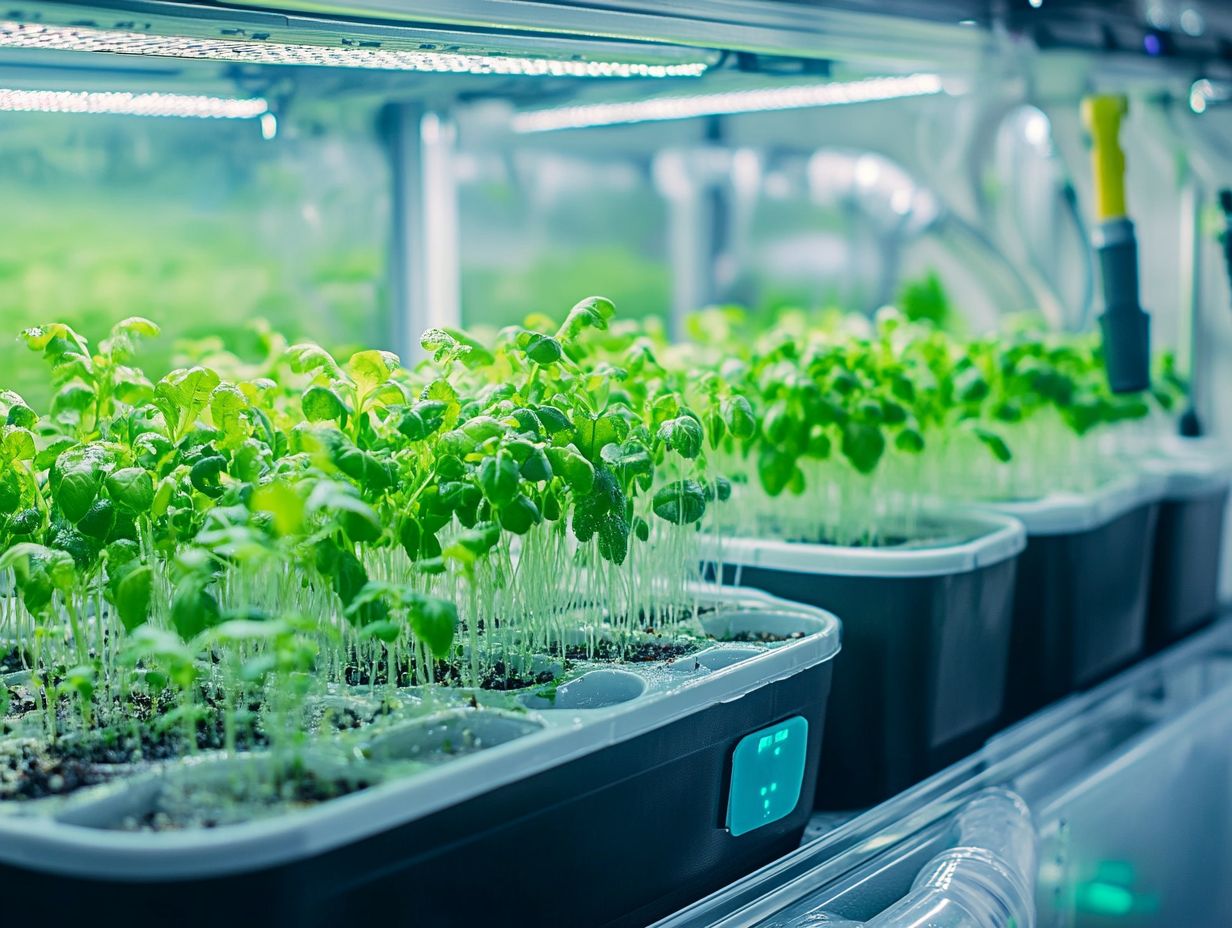
To ensure longevity, regularly clean and replace the components of your hydroponic system, such as the reservoir, pumps, and tubing. This will prevent the build-up of algae, bacteria, and other contaminants that can affect the health of your plants.
Start implementing these tips today to watch your hydroponic garden thrive!
What are some common issues that can affect the longevity of a hydroponic system?
Poor water quality and inadequate nutrient levels can harm your hydroponic system.
Regular monitoring and adjustments are crucial for healthy plant growth.
Can using organic nutrients help prolong the longevity of a hydroponic system?
Yes! Organic nutrients are less likely to build up and clog your system.
They also support healthier plants and reduce nutrient shortages.
How often should I replace the nutrient solution in my hydroponic system?
Change the nutrient solution every 1-2 weeks.
This practice helps maintain its quality and keeps your system running smoothly.
Are there any preventative measures I can take to ensure the longevity of my hydroponic system?
Definitely! Use high-quality components and clean your system regularly.
Monitoring nutrient levels and ensuring proper ventilation will also help.
